No celebration is fulfilled without the presence of music. On October 1st, 2024, the People’s Republic of China, which was founded on this date in 1949, commemorated its 75th anniversary. On September 29th, just two days before the National Day, a gala was presented at the People’s Great Hall on the Tiananmen Square of Beijing on September 29th.
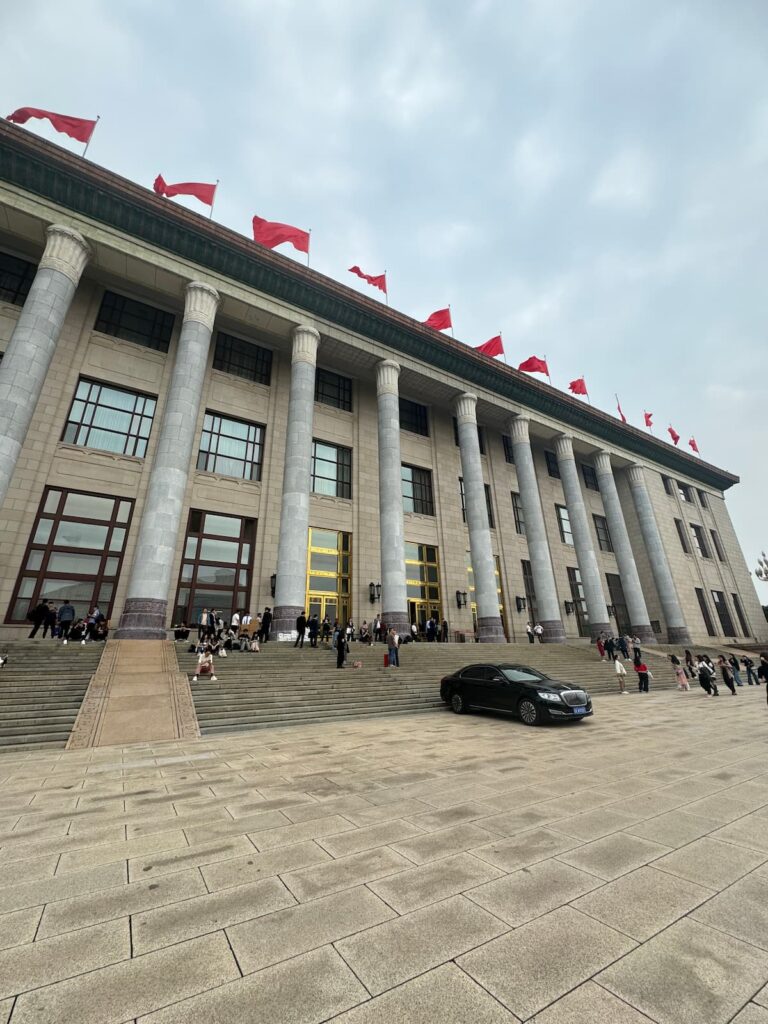
The People’s Great Hall
The gala was no different from all the other galas staged in every province and performed by every publicly funded orchestra preceding the holiday: a grand occasion with a continuous flow of red (aka communist or mainstream) music presented in a Mao-era stage setting enhanced by flashy modern technology. The gala has to be red in both tune and sight. Music is its spine and soul.
But the celebratory gala in Beijing is destined to be distinctive from all the peers, not only because it took place at the People’s Great Hall, seat to the Chinese parliament and China Communist Party’s national congress held every five years, but it was attended in person by Xi Jinping, President of China, as well as all the members of the Politburo. For all the musicians who pledged allegiance to the Party, being granted an audience by President Xi and performing for the top echelon of this country is the closest to a lifetime achievement. In return, a stage pass to the heavily guarded premises that requires the highest security clearance is deemed a warrant of, first and foremost, pronounced loyalty other than artistic excellence.
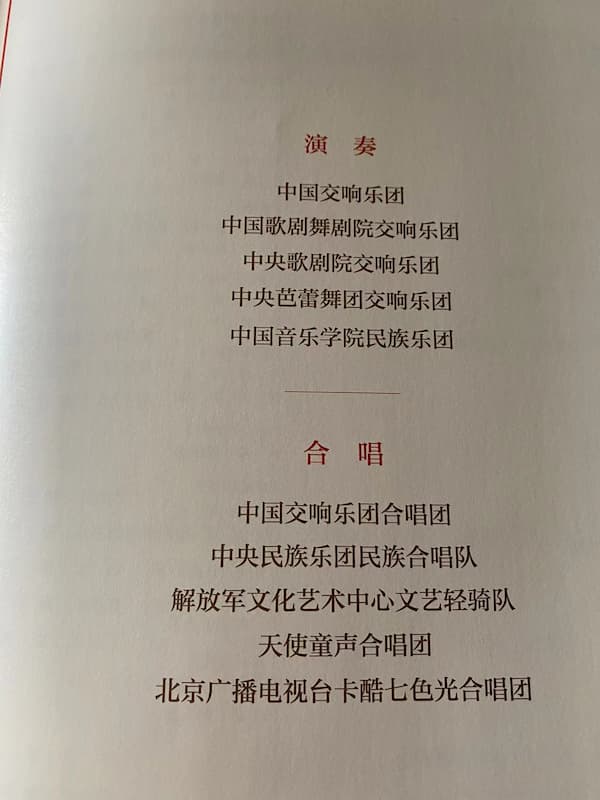
Programme-wise, the gala was divided into eight parts, including the national anthem, the prelude, five chapters, and a sing-along as the conclusion. After the anthem was fanfare, the orchestra performed a fitting tribute, “Today Is Your Birthday.” Five chapters followed and were performed back to back. Some of the classic orchestral and choral pieces were heard: selections from Guan Xia’s First Symphonic Overture, Xian Xinghai’s defiant Yellow River Cantana, and Shi Guangnan’s Song of Harvest.
Newly composed incidental music for this grand occasion was largely adapted from 22 popular mainstream songs as listed in the programme book, notably Qigang Chen’s You and Me, the lullaby-like 2008 Beijing Olympics official theme, by a team of seven composers and songwriters. The gala dropped its curtain after all sang “Sing for the Nation”. Seen and heard, the gala serves one purpose and one purpose only: to display the strength and unity of China under the leadership of the Party through a sonic campaign.
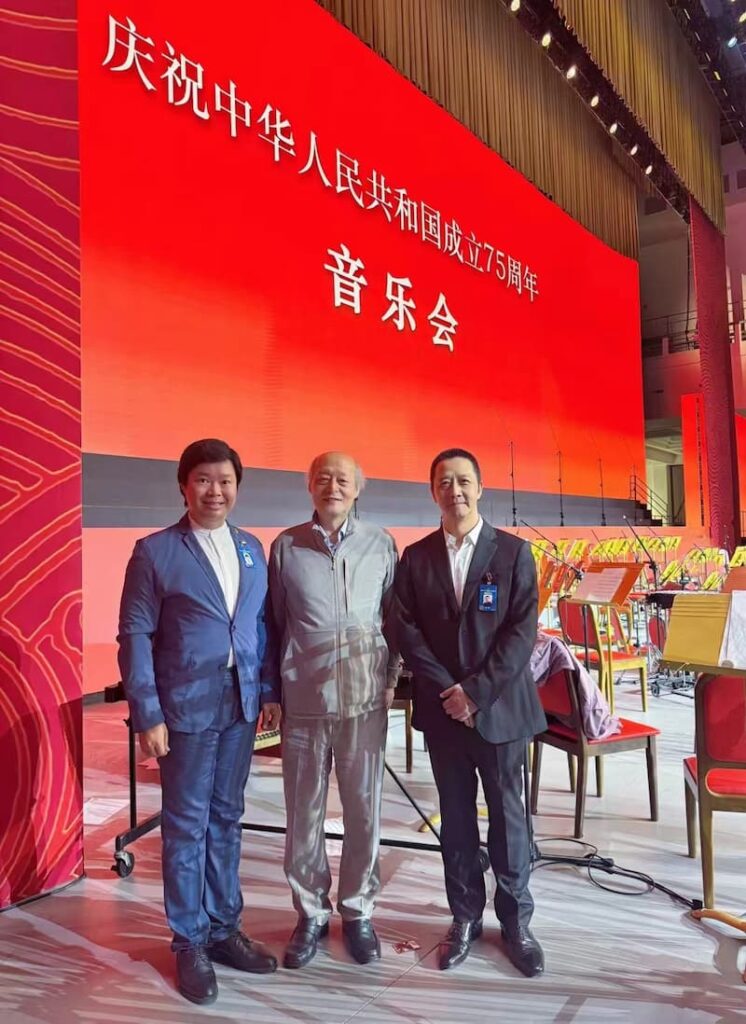
Guan Xia (middle) with the creative team
The gala provides a rare sneak peek into Xi’s personal preferences in terms of musical taste. It would be too far-fetched to think he had hand-picked the musicians and suggested the programmes. But it would be safe to surmise that, commended by the Ministry of Culture and Tourism and the Municipality of Beijing, which jointly presented this gala, the cast and its programme would have to get the ultimate nod from Xi before it could go ahead. Judging from this gala, you may wonder who are the musicians with whom Xi has a special affinity, and who is the man or woman in charge of the music after all?
The concert, where Xi was among some 3,000 privileged audience members, kicked off at 20:00 on September 29th. Musicians from five orchestras, four affiliated with the Ministry of Culture and Tourism and one affiliated with the Municipality of Beijing, have been solicited to assemble an orchestra of some 100 musicians. The four Ministry of Culture and Tourism affiliations are the China National Symphony Orchestra (CNSO), China National Opera and Dance Drama Troupe Orchestra, China National Opera Orchestra, and the China National Ballet Orchestra. The China Conservatory of Music Chinese Orchestra is affiliated to the Municipality of Beijing.
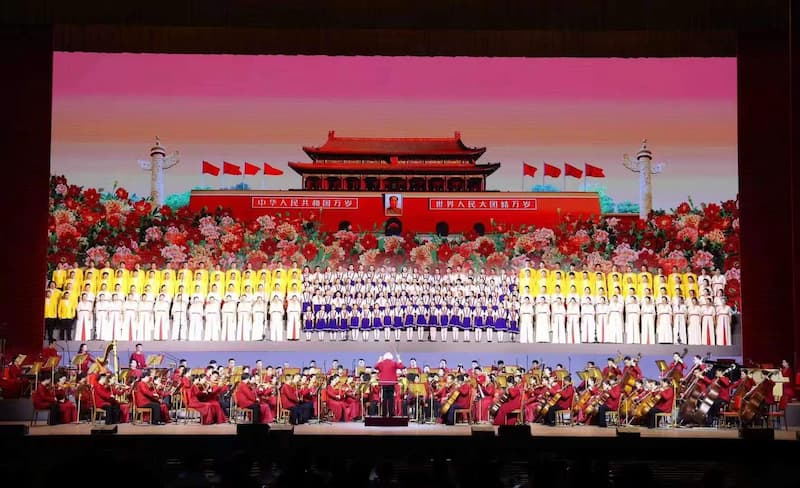
Chen Xieyang is conducting
Around 100 choristers affiliated to the CNSO, China National Traditional Orchestra, the Armed Forces and teenagers affiliated to the Beijing Radio and TV Station Children’s Choir formed a chorus and performed in the gala. Beijing-based pianist An Tianxu, who made his name in the 2019 Tchaikovsky Competition in Moscow due to unexpected swapping programmes from the orchestra in the final, was the soloist in the medley with tunes taken from five communist songs in an arrangement of Huang Kairan, staff composer of the CNSO.
Three conductors have been summoned to share the baton.
Chen Xieyang, born in 1939, is the eldest among the trio. A former music director, now music director emeritus of the Shanghai Symphony Orchestra, former artistic director of the China National Opera and principal guest conductor of the CNSO, Mr Chen is among the most charismatic stage animals on the podium who has developed a lifelong connection with the sitting President in China. He has conducted the galas for Xi, celebrating the 65th and 70th anniversaries of PRC, and at various state visits. Chen is the Music Director of the Suzhou Symphony Orchestra. He conducted the first half of the gala.
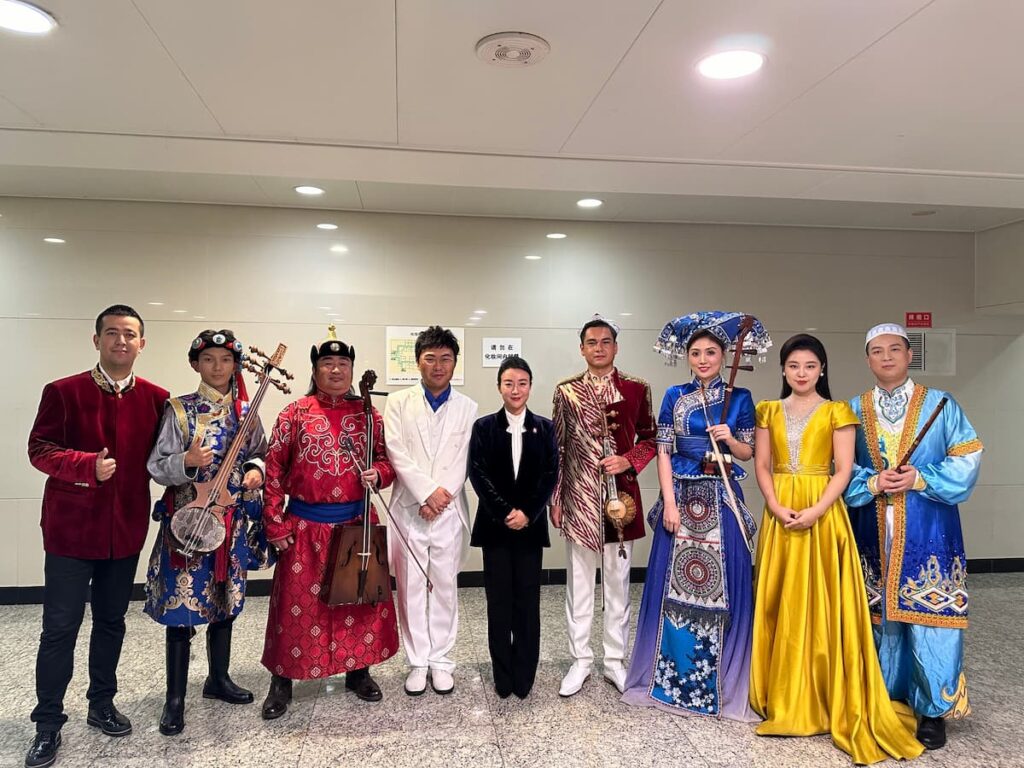
Jing Huan with ethnic musicians
Ms Jing Huan, second in appearance, conducted the third part, which heavily featured Uighur and ethnic music. Born in 1981, Ms Jing served as principal conductor of the Guangzhou Symphony Orchestra for a long time until Huang Yi was named successor to Long Yu, GSO’s former music director. After being promoted to music director of GSO’s Youth Orchestra, she has enjoyed a skyrocketing career, leading the orchestra for two critically acclaimed appearances at the Verbier Festival in August 2023. In September 2023, she was appointed principal conductor of the CNSO, ushering her to the inner circle in Beijing.
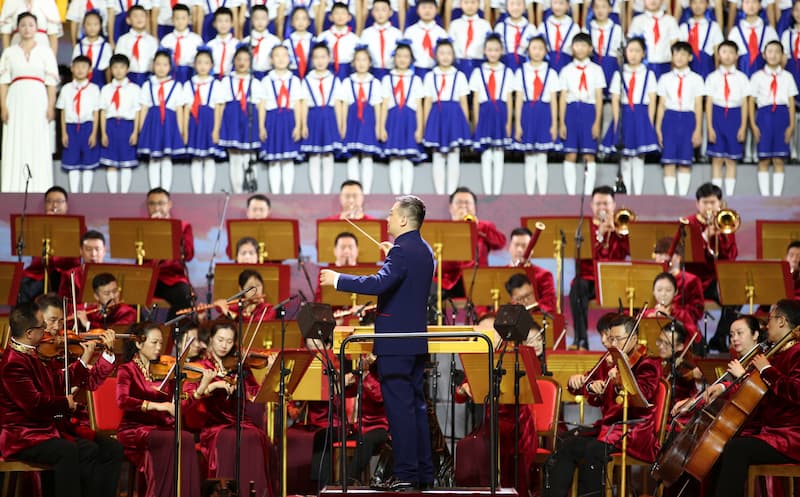
Zhang Yi is conducting
Born in 1972, Zhang Yi was the last to appear in the gala and conducted the final part among the four parts. Serving as artistic director of the China National Ballet Orchestra and the Shanghai Philharmonic Orchestra, he has been known as a champion of contemporary music. In April 2018, he was appointed Director of the CNSO but resigned after just one year in the office in April 2019. A source told me he felt drained by the office and administrative work, which prevented him from conducting any more. Hence, the resignation.
To pull things together and assemble a dream team of loyal, established and promising musicians that Xi feels inclined to watch and listen to is someone Xi and his family trust most. Guan Xia, designated Master of Music for the gala, was a prolific composer and Director of the CNSO for over a dozen years till he retired in 2018. The title role of Guan’s opera Mulan Psalm was created by Peng Liyuan, a lyric soprano, in 2004. Peng became the First Lady when Xi took the top job in China in 2013. Guan remains active as a composer and a close ally of the Xis even after his retirement. His First Symphonic Overture (2013) opened the first part of the gala.
I had the privilege and pleasure of working with Mr Guan during and after his tenure at the CNSO till the Covid pandemic struck. In 2015, together with Christopher Widauer, then Head of Digital Development of Wiener Staatsoper, we developed a plan for Guan to be introduced to an international community and for the CNSO to gain more global recognition, with an ultimate dream for the CNSO to be invited by the Salzburg Festival in 2019.
The plan worked out smoothly, benefiting from Guan’s open-minded and flexible attitude among cadres of his ranking and from an unbiased international community curious about a much-storeyed national orchestra and its most seclusive director.
The plan started with Guan taking part in a panel discussion moderated by me at Classical: NEXT, held at De Doelen in Rotterdam in May 2016. There, he was introduced to Dr Matthias Röder of the Karajan Institute and the top management of Berliner Philharmoniker. Guan was kind enough to agree to talk about the orchestra scene in China in a pre-recorded video intended exclusively for Classical: NEXT in the previous year.
Inside Chinese Orchestras- Guan Xia of China National Symphony Orchestra
In July 2016, when CNSO celebrated its 60th anniversary with a gala at the National Centre for the Performing Arts in Beijing, Wiener Staatsoper TV produced and live-streamed the gala to the international community. This was the first of its kind in China and the first international guest stream by Wiener Staatsoper TV. Representatives from Wiener Staatsoper and Berliner Philharmoniker attended the ceremony.
Guan is among the few Chinese musicians to take part in the Wiener Staatsoper’s Opernball on February 22, 2017. In fracks and tuxedos, we were greeted by Dominique Meyer and led to the box for a meeting with the Minister of Culture of Austria. The following morning, Guan met with Dr Helga Rabl-Stadler, then President of the Salzburg Festival, at the cafe of Hotel Sacher to propose a joint concert of CNSO with Berliner Philharmoniker at the Salzburg Festival. The plan had to be dropped when Guan retired in the following year.
Over the years, Mr Guan impressed me as a musician who not only appreciates the genuine charm of music but understands and recognises its gravity by following, if not manipulating, its natural course. As a politician, he is willing to listen, open to new ideas, and dares to dream big. I enjoyed working with him as a music critic and personal international affairs advisor. If only there were more high-ranking musicians like him, how would the world perceive China differently?
For more of the best in classical music, sign up for our E-Newsletter



